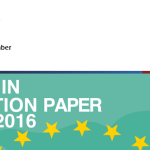The Reduction to the number of Items in the China (Shanghai) Pilot Free Trade Zone ‘Negative List’ is Welcomed by European Industry but Further Measures to Reduce its Scope and Speedy Nationwide Implementation of the Piloted Reforms are Still Needed Go back »
2014-07-01 | All chapters
This is the first reduction to the Negative List following its release nine months ago. Since then, the Decision of the Third Plenum has been promulgated. The Decision clearly shows that there is consensus among China’s leaders that deep and broad reforms are required nationwide. The CPSFTZ, as such, has from the start been positioned as a testing ground for these reforms and for further opening up to foreign industry. Some of the items that have been removed from the Negative List are in important sectors. The revised list offers foreign enterprises greater freedom to participate in inter alia the real-estate sector by allowing firms to invest in construction, and certain manufacturing sectors such as pharmaceutical drugs, auto components and textiles. European investment into these areas could serve to bring strong benefit to China’s continued economic and societal development.
Stefan Sack, Vice President of the European Chamber and Chairman of its Shanghai Chapter, said, “In a recent survey conducted by the European Chamber, over half of European companies viewed the inauguration of the CSPFTZ as a major step towards the opening-up of the Chinese market and the creation of a level playing field for foreign business. The reduction to the scope of the Negative List re-establishes European companies’ confidence in China’s commitment to the CSPFTZ. There is, however, still great room for further eliminating many of the remaining barriers to foreign investment in the zone that would bring benefit both for European business and for China. European Chamber members hope that additional amendments will be taken in a timely and transparent manner, and that these further rounds will involve consultation with international stakeholders.”
Mr Sack added, “In addition to further reducing the scope of the Negative List, what is more important is that the Shanghai authorities now also work with China’s central-level authorities to coordinate a speedy nationwide rollout of the Negative List approach and to ensure that those reforms successfully piloted in the zone start to be implemented all across China this year. The full name of the zone is the China (Shanghai) Pilot Free Trade Zone. For me, the two most important words in this are ‘China’ and ‘Pilot’ as they show the intention of the zone as a testing ground for rollout nationally. China urgently needs reforms, so it is important that the CSPFTZ—as a pilot zone—not become a bottleneck to central-level implementation but instead help to accelerate reforms throughout China.”
About the European Union Chamber of Commerce in China
The European Union Chamber of Commerce in China was originally founded by 51 member companies based in China on 19th October 2000. It now has approximately 1,800 member companies throughout China across nine offices in seven chapters. The rationale for the establishment of the European Chamber was based on the need of the European Union and European businesses in China to find a common voice within various business sectors. The European Chamber is recognised by the European Commission and the Chinese authorities as the official voice of European Business in China, and seeks greater market access and improved operating conditions for European companies.
欧洲企业欢迎中国(上海)自由贸易试验区“负面清单”的缩减,希望采取更多措施进一步减少其范围,并认为应尽快在全国范围内推广试点改革。
2014年7月1日,北京—中国欧盟商会非常高兴地看到中国政府在6月30日发布的中国(上海)自由贸易试点区负面清单中削减了覆盖范围。在这份通知中,外国资本依旧受到限制的条目从190项缩减到139项。这相当于减少了负面清单中将近27%的项目。虽然削减的程度稍稍低于欧洲企业界的预期和之前的一些官方预测性声明,但这仍是一次可观的削减,此举亦是向正确的方向迈出了鼓舞人心的一步。
这是继“负面清单”九个月前发布后的第一次删减。在那之后,三中全会的“决定”也相继出台。“决定”清楚表明中国的领导人对在全国范围内开展深入广泛的改革的紧迫性已经达成共识。诸如从一开始,中国(上海)自由贸易试点区就被作为这些改革和对国外行业更深度开放的一块试验田。一些从“负面清单”中抹去的条目属于重要行业。修改后的清单给予了外国企业更大的自由度,来参与到包括房地产行业在内的建筑业以及某些特定的制造业,诸如医药业、汽车零部件制造业和纺织业的投资。欧洲资本进入这些领域会对中国经济和社会的持续发展带来很大的裨益。
中国欧盟商会副会长、上海分会主席斯蒂芬·赛克先生说,“在欧盟商会最近的一个调查中,超过半数欧洲企业把中国(上海)自由贸易试验区的设立看做中国市场开放的重要一步,认为其为外企在华公平竞争创造了条件。降低负面清单规模重新巩固了欧洲企业对中国有关上海自贸区的承诺的信心。然而,消除试验区内剩余壁垒仍然有很大空间,这么做会给中国和欧洲企业都带来利益。欧盟商会成员希望,对清单的进一步修订会及时、透明地进行,且过程中应咨询国际利益相关方。”
赛克先生补充说,“除了进一步减少负面清单的范围,更重要的是,上海地方政府现在正与中央机关协调工作,将负面清单管理模式迅速在推广,并确保那些在试点区域成功实施的改革措施在全国范围内开展。该区域的全称是中国(上海)自由贸易试验区。对我来说,这其中的两个关键词是“中国”和“试验”,因为它们显示出该区域意将试验田的模式部署全国。中国迫切需要进行改革,因此重要的是中国(上海)自由贸易试验区作为试点区域,不应成为中央层面执行的瓶颈,而应帮助整个中国加快改革。”
关于中国欧盟商会
中国欧盟商会由51家会员企业于2000年10月19日成立。会员总数如今已突破1800家,设有七个地区分会,由九个办公室分别管理。其宗旨是应欧盟及欧盟企业的需要,代表不同产业领域寻求共同的声音。欧盟委员会与中国政府机构都已认可商会为欧盟企业在华的独立官方代言机构,旨在为欧盟企业争取更大的市场准入和更好的经营环境。
For more information please contact
Xinhe Fan
- +86 (10) 64622066 ext.35
- xhfan@europeanchamber.com.cn

